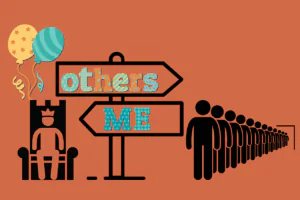guest post by Sheri Leasure, LCSW
Have you ever had an argument with yourself? For example, you get invited to a party and the following dialogue takes place inside your head:
“I really should go. I haven’t been to anything social in weeks.”
“But what if I say something stupid? Or can’t find anything to wear?”
“I’ve got to get over this anxiety and actually hang out with people or I’ll never have any friends!”
“No one’s going to like me anyway! What’s the point?”
If this sounds familiar, the good news is that you’re not alone. Most people talk to themselves all the time, so it is not necessarily a sign of mental illness. However, if you find that one part of you is often at odds with another part, this might cause difficulty making decisions and a certain amount of anxiety, Internal Family Systems therapy may help! In fact, this article specifically talks about treating anxiety with Internal Family Systems.
What is It?
Internal Family Systems (IFS) is a type of therapy created about 40 years ago by Richard Schwartz. IFS is an evidence-based practice for PTSD, depression and anxiety. Several studies have shown that people treated with IFS have experienced improvement in their overall health and sense of self. They also have decreased symptoms of panic, depression, and generalized anxiety.
Five central ideas underly the work of IFS:
- Your mind is made up of different parts that compose a system, like a little internal family. Each part has its own unique role, voice and needs.
- You have a core Self that is equipped to lead your internal family system with compassion, clarity and calm.
- All parts of the mind exist for a reason, usually to protect you from becoming overwhelmed. Not all parts perform their roles in effective ways, however, and some anxiety disorders result from parts not getting along. They sometimes argue or mistreat one another, just like a typical family.
- Some parts try to prevent others from expressing themselves. For example, if you have experienced trauma, a part of you may carry the painful memories and body sensations associated with the traumatic experience. A protective part may try to keep this traumatized part from expressing its pain so that you don’t get overwhelmed. The result, however, is that you can feel as though part of yourself is lost, exiled, hiding. This can cause you to be afraid of what could happen if you begin to feel or remember. In turn, this leads to symptoms of anxiety.
- Getting to know and learning to lead your own internal family system can decrease anxiety and increase feelings of wholeness, balance and confidence.
How Internal Family Systems Therapy Helps Anxiety
When you suffer from anxiety, multiple parts of self typically are in an internal dialogue. They vie for attention and control to keep you from acting in any way that those parts feel may lead to danger.
Protective parts may sound critical. For example, if you suffer from anxiety in social settings, you may have a part in your mind that says things like, “No one is going to like you. You always make a fool of yourself in public.” This critical part, though very harsh sounding, may actually be trying to protect you from harm by convincing you to avoid being in public, which has proven to be painful in the past.
At the same time, you may have another part saying, “But I need friends! I’m so lonely and sick of being by myself every weekend!” This part, while sounding completely the opposite of the critical one, is also trying to protect you by convincing you that you need social connection instead of isolation.
A therapist familiar with Internal Family Systems can help you identify what parts of the mind may be driving the anxiety. They can show you how to begin to befriend those parts. The therapist acts as a coach, helping you learn to treat each part with kindness, to get to know them, and to identify and meet their needs. You then help them compromise with other parts so that there is more harmony in your mind. As these inner parts begin to get along better, you will feel less anxious and make decisions more easily. You will also feel more compassionate towards yourself.
For instance, the therapist may use an empty chair and have you imagine that one part of your mind is sitting in the chair. They may help you begin a conversation with that part. In doing so, you find out what role it plays in your mind, what it needs, and what its fears are. This may sound strange, and it can be an odd experience to talk to a part of yourself! However, with some openness and imagination, it can also be a fun journey of self-discovery that leads to feeling more in control and calmer than you have ever felt.
Related Reading: Social Anxiety Therapy
Resources for IFS
If you’d like to discover more about Internal Family Systems therapy, consider the excellent description by Derek Scott, the founder of Internal Family Systems Counseling Association: Exploring your Own System – IFSCA. And if you’re considering seeking IFS therapy, know that Internal Family Systems groups, individual, and couples therapies are available.
If you are in Illinois, suffer from anxiety, and think that Internal Family Systems therapy might be a good fit for you, trained therapists at Life Care Wellness are here to help! Please reach out to us in our Northern Illinois locations in Glen Ellyn, Chicago (Jefferson Park), Sycamore, or Yorkville.
Sheri Leasure, LCSW, is a Licensed Clinical Social Worker with training in Internal Family Systems, Somatic Experiencing, Eye Movement Desensitization and Reprocessing (EMDR), Mindfulness, and Dialectical Behavior Therapy (DBT). She sees adult clients in the Glen Ellyn and Sycamore offices.






